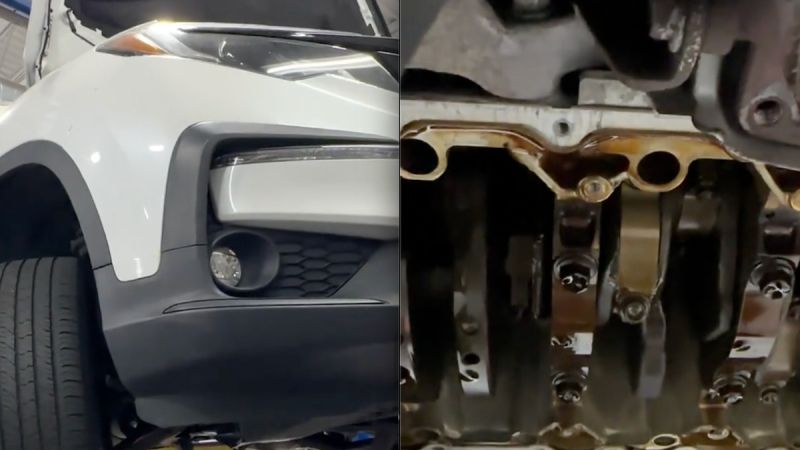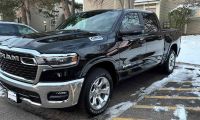Why did a 2022 Honda Pilot owner have engine failure at only 87,000 miles?
Is the Pilot a reliable vehicle? According to Honda master tech, BC Auto (@bcauto_), a trusted expert in the field, the Honda Pilot, if properly maintained, should exceed 200,000 miles. However, his customer says he hears a noise from the Pilot's engine.
The Honda Master Tech, a seasoned professional with years of experience and expertise, is a reliable source of information for Honda Pilot owners.
In his TikTok clip, the Honda tech is looking underneath a customer's 2022 Honda Pilot and says, "Here is a 2022 Honda Pilot with 87,000 miles, and the customer says they hear a knocking from the engine," as he removes the oil pan to reveal the lower crankshaft bearings.
Imagine owning a Honda Pilot you bought because you heard it was a reliable vehicle. You've owned it for three years, and it's been a good vehicle.
However, you drive a lot of miles—24,000 a year, which is double the average. Because you drive so much, it's easy to forget about getting your SUV in for maintenance, and you go over the recommended miles for your oil changes.
One day, you hear a knocking sound from the engine, and you take it to a certified Honda technician to check it out. The diagnosis is not what you want to hear.
Let's pick up the story.
As he looks inside the lower engine, the Master Honda tech jiggles the rod bearing, moving back and forth, showing extreme wear on the parts. That's where the noise is coming from.
He continues, "Yep, we are getting a short block for this one."
The Pilot Needs a New Engine
Surprisingly, the Pilot needs a short block, essentially the engine's bottom end. It consists of the engine block, crankshaft, pistons, connecting rods, and associated parts like bearings and gaskets. This repair won't be cheap.
How Much Does It Cost?
A short block for the 2022 Honda Pilot will cost the customer between $4,500 and $5,500. Depending on the shop, labor costs could add another $1,800 to $3,000. The total will be between $6,300 and $8,500. Ouch.
What happened to the 2022 Pilot's Engine? Did the owner use the wrong oil?
First, the Honda Master Tech disagrees with Honda's oil recommendation.
A comment from Steve Wilkes says, "I'm convinced the use of these very thin synthetic oils is not protective enough to the internal components."
Master Tech BCauto_says, "I use 5W30 in all my engines. This car was using 0W20, so yeah, I agree."
What Oil Does Honda Recommend?
Honda recommends the use of 0W20 synthetic oil in the 2022 Honda Pilot.
Can using the wrong oil cause engine failure in a Honda Pilot?
Using the wrong oil in a Honda Pilot can lead to engine failure. While using the wrong oil might not cause immediate failure, it can lead to increased wear and tear, reduced engine life, and even eventual failure if continued for long periods.
Here's why:
- Inadequate Lubrication: The wrong oil may not provide the necessary lubrication to protect the engine's moving parts, leading to friction and wear.
- Reduced Performance: Using the wrong oil can affect engine performance, potentially causing issues like reduced fuel efficiency, unusual engine sounds, and difficulty starting in cold conditions.
- Component Damage: Over time, inadequate lubrication can damage critical engine components like bearings, pistons, and the oil pump, ultimately leading to failure.
- Potential for Overheating: Using the wrong oil can also affect the engine's ability to cool, leading to overheating and further damage.
Important Note: The specific consequences depend on the severity and type of oil used. Using a transmission oil instead of engine oil is a more severe mistake than using a different viscosity (e.g., 5W-30 instead of 5W-20), but both can have detrimental effects.
Recommendations:
- It's crucial to always refer to your owner's manual for the recommended oil type and viscosity for your Honda Pilot. This simple step, within the owner's control, can prevent costly engine repairs and keep your vehicle running smoothly.
- If you're unsure about the correct oil, consult a qualified mechanic.
- Regular oil changes with the correct type of oil are crucial for maintaining engine health and preventing premature failure. How often should you change your oil?
- Whether you use synthetic or conventional oil, Honda recommends changing the oil and filter every 7,500-10,000 miles for synthetic oil and every 3,000-5,000 miles for conventional oil.
The Honda master tech says the Honda Pilot should exceed 200,000 miles if properly maintained. Why did this 2022 Pilot owner's engine fail at 87,000 miles if the owner was using the correct oil?
The Honda Pilot's V6 engine is known for its durability and ability to last for high mileage with proper maintenance, according to Frankleta Honda.
High Reliability Scores:
The 2022 Honda Pilot has a predicted reliability score of 81 out of 100, according to U.S. News and World Report, putting it in the "high" reliability category.
This score is based on various factors, including owner feedback, expert evaluations, and historical data, providing a comprehensive view of the vehicle's reliability.
However, without proper maintenance, the 2022 Honda Pilot or any vehicle will not hold up if used in severe use environments.
It's Not the Oil's Fault, It's the Lack of Maintenance
Regular maintenance is the key to preventing premature engine failure. By following the manufacturer's recommendations for oil changes and other routine tasks, you can ensure your Honda Pilot stays reliable for years to come.
Driving habits and conditions will affect how often you should change your oil. After your first oil change, Honda says you should change the Pilot's oil every 7,500-10,000 miles using synthetic oil. But this is if you drive in "normal" conditions. Most engines operate in extreme conditions.
What are the extreme driving conditions?
Extreme conditions include:
- Frequent engine braking (downshifting the transmission to decelerate the vehicle).
- Engine operation at sustained high rpm (sustained highway driving or driving in mountainous terrain).
- Frequent acceleration and deceleration (stop-and-go freeway traffic).
- Severe thermal conditions (extreme heat or cold).
- Idling for extended periods (frequent and sustained remote engine-start operation).
Extreme conditions require more frequent oil changes.
If you drive in extreme conditions, you must change your oil more frequently. Auto Care recommends changing it every 3,000-5,000 if you use synthetic oil, especially if you have more than one of the above extremes.
Conclusion:
The 2022 Honda Pilot owner likely didn't change the oil as often as they should. This resulted in premature engine wear. Now, they need a new short block and an expensive engine repair.
Ultimately, it's always cheaper to change the Pilot's or any vehicle's oil often, especially if you drive in conditions like frequent short trips, idling, extreme temperatures, and towing.
How About You?
Do you own a Honda Pilot? Has your model been reliable? If so, click the red Add New Comment link below and let us know. Your experiences and insights can help other Honda Pilot owners and potential buyers make informed decisions.
Check out my 2025 Honda Pilot story: My 2025 Honda Pilot Died in the Middle Of An Intersection With My Kids in the Car, and Honda Can’t Figure Out What’s Wrong With It
I am Denis Flierl, a Senior Torque News Reporter since 2012. My 30+ year tenure in the automotive industry, initially in a consulting role with every major car brand and later as a freelance journalist test-driving new vehicles, has equipped me with a wealth of knowledge. I specialize in reporting the latest automotive news and providing expert analysis on Subaru, which you'll find here, ensuring that you, as a reader, are always well-informed and up-to-date. Follow me on my X SubaruReport, All Subaru, WRXSTI, @DenisFlierl, Facebook, and Instagram.
Photo credit: Denis Flierl via BC Auto
Set Torque News as Preferred Source on Google











Comments
I feel your pain, brother…
Permalink
I feel your pain, brother. My 2006 Pilot has 273,000 miles on it and it has a bad valvetrain noise. The variable cylinder management system has failed. I cannot pass emissions, so the vehicle gets donated tomorrow. I put all 273,000 miles on the dial, so this is a painful departure.
Why not just install new rod…
Permalink
Why not just install new rod bearings, if there’s no other issues, instead of replacing whole lower engine? And save tons of $’s. Had the same issue with a Jeep Wrangler and the engine performed fine until I sold it a few years down the road.
HAVE 2021 PILOT BLACK HAVE…
Permalink
HAVE 2021 PILOT BLACK HAVE 40K ON IT STILL VERY GOOD CHANGE ATF ONCE A YEAR OR 12K MILES OIL CHANGE ABOUT 7K WITH ROYAL PURPLE OIL.CHANGE ALL O2 SENSOR AND SPARK PLUG AT 35K.BUT THEY CAN LAST UP TO 100K.PURGE VALVE FAIL REPLACE AT 28K.I INSTALL ATF COOLER FOR THIS CAR WHICH IS BETTER FOR TRANSMISSION.ABOUT TO REPLACE REAR WHEEL BEARING ALL CONTROL ARM AND AXAL DRIVE AS PREVENTIVE.BUT I DO ALL MY SELF SO IS FREE LABOR.
I had a 2004 Pilot that had…
Permalink
I had a 2004 Pilot that had more than 230k miles on it with no engine trouble. It was maintained by the book, including transmission oil changes. It is crucial to use genuine Honda transmission fluid. The previous owner had not done so, and the transmission was shuddering. I was told I needed a new transmission at 124k miles. Instead, I replaced the fluid with Honda fluid every 30k miles. I never had another problem.
Having worked on Honda…
Permalink
Having worked on Honda vehicles for many years I can say that having a failure in the crankshaft area is going to come back to lack of, or improper maintenance. I replaced a block because the owner got an oil change somewhere and they ran it without oil.
They just don't fail.
Hondas fail all the time…
Permalink
In reply to Having worked on Honda… by John (not verified)
Hondas fail all the time. Even when well maintained. Ours was the most unreliable car I ever owned.
It's because of the VCM. It…
Permalink
It's because of the VCM. It kills the engine. Honda knows this too. You need to disable it. I have a 2019 Pilot with zero engine issues at 110k miles because I use a VCM tuner. I love Honda, but they're hiding this from people.
My 2006 Pilot has 260,000…
Permalink
My 2006 Pilot has 260,000 miles on it. I change the oil every time the reminder comes on, approximately 5000 miles.
Runs like a champ. Taking it on a 700 mile road trip next week.
IMO this is a Honda planted…
Permalink
IMO this is a Honda planted story to tone down the current issue and recall of several Pilot model years. It was found that the crankshaft machining of some VINs over years 2016-2020 were improperly managed at one or more supplier. This is a NTSA recall, look it up. Somehow the 2017 model was omitted from the recall, but is now part of a new study by NTSA. My 2017 Pilot had the same issue and failed at 63,000 miles. To my surprise, Honda and the dealer fixed the issue at minimal cost to me. Even so, I now own a 2025 Toyota Grand Highlander after owning Hondas and Acuras since 1984.
Funny how the writer assumes…
Permalink
Funny how the writer assumes the owner didn't change the oil. Hondas fail all the time. Even when well maintained. Ours was the most unreliable car I ever owned. I never owned a car that required synthetic oil changes at 3000 miles. That's nonsense. All my cats hit 200k (except my Honda) on standard oil. People need to stop being a fanboy otherwise Honda will keep making crap.
We bought a 2008 Honda Pilot…
Permalink
We bought a 2008 Honda Pilot in 2017,never have any problems with it, l just love driving it,it's very comfortable. We maintain regularly but two weeks ago l heard a knocking sound from underneath,took it to our mechanic, he said something about the strut or something needs to change,the cost $1400. Now two days ago l am not hearing any knocking sound. Should l be scared to drive it. Thanks listening.
I had the same engine…
Permalink
I had the same engine failure with my 2003 Honda Pilot with 143k (2024). I was chasing a misfiring problem. Did all recommended service. The Glenwood Springs CO.Honda Dealer after doing a compression test said the engine was solid a
nd insisted that the engine needed a valve adjustment ($1060.00) to correct the misfire. The car ran worse than when I brought it in for repair. Then the service manager suggested the MASTER TECNICIAN take a look, who worked on it the first time??? The homeless guy? The car blew up less then 1 tank of gas later. Same problem lower bearing. Small print on receipt said if misfiring continues NEW ENGINE. BUY TOYOTA!!!! THANKS Brian
I had the same engine…
Permalink
I had the same engine failure with my 2003 Honda Pilot with 143k (2024). I was chasing a misfiring problem. Did all recommended service. The Glenwood Springs CO.Honda Dealer after doing a compression test said the engine was solid a
nd insisted that the engine needed a valve adjustment ($1060.00) to correct the misfire. The car ran worse than when I brought it in for repair. Then the service manager suggested the MASTER TECNICIAN take a look, who worked on it the first time??? The homeless guy? The car blew up less then 1 tank of gas later. Same problem lower bearing. Small print on receipt said if misfiring continues NEW ENGINE. BUY TOYOTA!!!! THANKS Brian
I had the same engine…
Permalink
I had the same engine failure with my 2003 Honda Pilot with 143k (2024). I was chasing a misfiring problem. Did all recommended service. The Glenwood Springs CO.Honda Dealer after doing a compression test said the engine was solid a
nd insisted that the engine needed a valve adjustment ($1060.00) to correct the misfire. The car ran worse than when I brought it in for repair. Then the service manager suggested the MASTER TECNICIAN take a look, who worked on it the first time??? The homeless guy? The car blew up less then 1 tank of gas later. Same problem lower bearing. Small print on receipt said if misfiring continues NEW ENGINE. BUY TOYOTA!!!! THANKS Brian
I have a 2021 Honda Pilot…
Permalink
I have a 2021 Honda Pilot with 49,000 miles. So far no troubles. I love it, but after reading these comments I’m scared. Don’t garages keep records of oil changes as well as repairs? If he has the records he should fight this. These 21 Pilots cost $40,000 new and you add a new engine that makes these a very expensive vehicle to own. Crazy.
Ive read the revue a and it…
Permalink
Ive read the revue a and it didn't mention anything of timing belt tensioner, I've one had a customer with same complaint and she was told that she too needed a new engine. The sound that was coming from her engine mimic the sound of the crank system could be the problem, but when I did a timing service the noise went away. I recommend to drop the engine oil and see if there is metal shavings if there is none perform a timing belt service.
I own a 2017 pilot with 102…
Permalink
I own a 2017 pilot with 102 000km. I heard a loud noise with a check engine. Bring it to the dealer. Diagnosis, connecting rod bearings are shot. Need a new engine. Not covered by Honda. I always follow oil change frequency and type recommended by Honda. New engine is too expensive so I'm going for a used on with 155 000km and possibly the same issue. I figure it's gonna cost me 20 000$ cdn. What can I do???
2003 Pilot 305k miles. Oil…
Permalink
2003 Pilot 305k miles. Oil changes every 5k miles. Reliable as a wood burning stove.
Why would Honda recommend…
Permalink
Why would Honda recommend oil for driving under “normal” conditions if most vehicles operate under “extreme” conditions as mentioned?
Sounds like more good ‘ol planned obsolescence.
After your first oil change, Honda says you should change the Pilot's oil every 7,500-10,000 miles using synthetic oil. But this is if you drive in "normal" conditions. Most engines operate in extreme conditions.